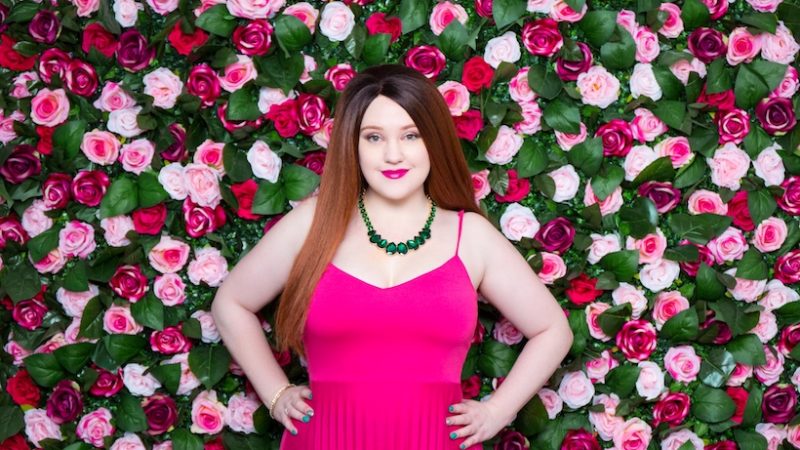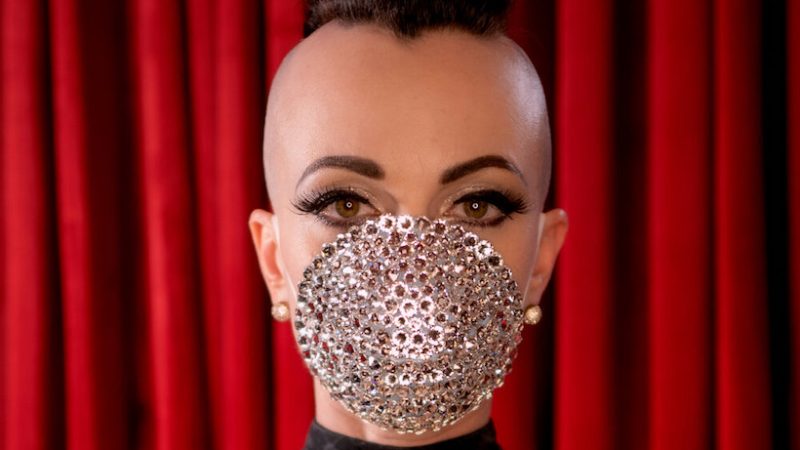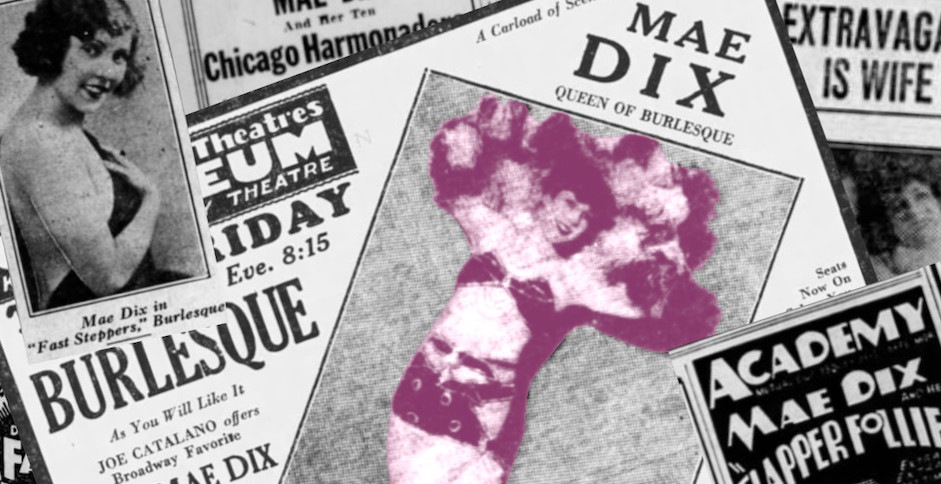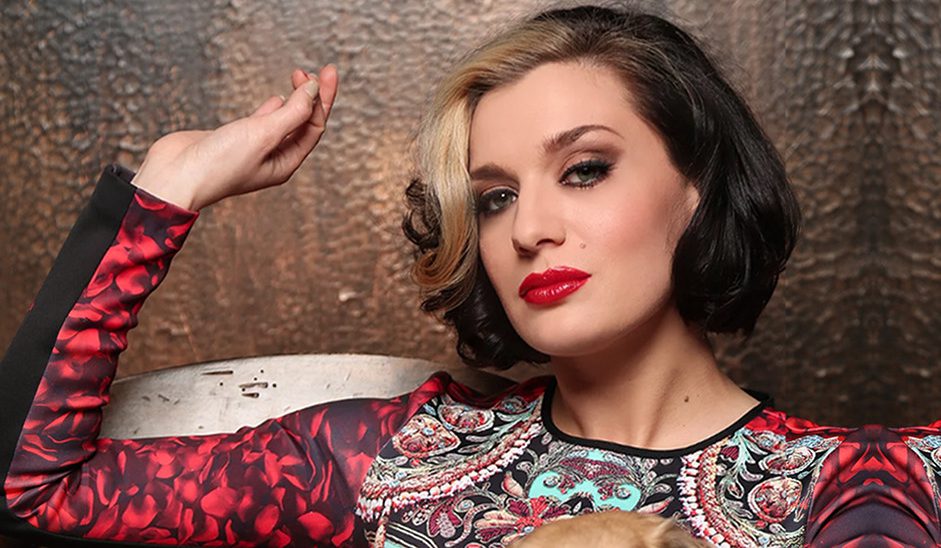Interview with Minda Mae, wheelchair using burlesque producer of the DisabiliTease Festival

Interview with Minda Mae, wheelchair using burlesque producer of the DisabiliTease Festival

When did you decide to bring Burlesque into your life?
In January 2018, I was legally housebound due to Ehler’s Danlos Hypermobility Syndrome, Fibromyalgia and a few other medical conditions.
In February, a friend of mine had an extra ticket to a burlesque show, here in Minneapolis. We found a wheelchair, set up medical transportation, and went to the show.
I was awe-struck at the beauty and confidence of the performers and after the show, I spoke with a few performers. One also had chronic health conditions, and mentioned Jacqueline Boxx – a performer that uses a wheelchair. A lightbulb went off in my head. I wanted to get well enough that I could do this – that I could reclaim my body both mentally and physically. I started doing in-home physical therapy to gain strength and once I could start using a walker, I began movement classes at the Twin Cities Burlesque Academy (then known as Playful Peacock Academy).
By the end of that series of classes, I was able to walk on my own and had built up strength, while learning burlesque movements.
I was hooked. The next year, I decided to expand my learning and started taking burlesque classes at ExperTease Fitness – that quickly expanded to include chair and belly dance classes and I haven’t looked back!
Do you remember how you felt the first time you performed in front of an audience?
Honestly, I have two big “first time” performances. My very first burlesque performance, I presented as able-bodied, so no one knew how big of a deal it was for me – and I was terrified! I was moving on stage with an invisible disability, and was reclaiming my body and confidence after an abusive marriage stripped away my identity.
In 2020, I had a slip and fall accident that led to me being an ambulatory wheelchair user. I am able to walk short distances, but am unable to dance on my feet. At first, I was really frustrated – I had just started to find myself and it felt like a setback, but I knew I could continue my journey, it would just look a little different.
On the advice of friends. I made the decision to look at my wheelchair as a tool, not an aid. The first time I performed with my wheelchair, I was terrified again. I was worried how people would judge me.
I’ve been able to push past any negative thoughts I had, and decided to just embrace it. I created a Wonder Woman act when I could still walk, and am proud of the progress I’ve made re-choreographing it to show the strength of the character and the different ways I can use my wheelchair in the act.

What was the reaction of the audience?
The reactions varied from people being very supportive of me and being proud of the work I had done to incorporate the wheelchair and push past my injury. They saw me grow as a person and a performer.
Unfortunately, I also got a lot of people that saw me as “inspiration porn” – where I was inspirational just for being on stage. They didn’t comment on my act, they commented on how brave I was to even leave the house and perform with a wheelchair. I knew people meant well but I just felt like a spectacle because they had never seen anyone perform in a wheelchair before.
I left that night feeling proud of myself, but also wondering if people would ever appreciate me as an artist, not just as someone who left the house and got on stage in a wheelchair.

How was born the “DisabiliTease Festival”?
After learning about a few other performers with disabilities, I started the Disabilibabe Facebook group.
Jacqueline Boxx created the term, and I love it. It’s an empowering term for performers with disabilities, regardless of gender identity or disability type. It’s a place where we can ask questions, offer support and share knowledge.
In the group, a lot of commonalities came out. We were all saddened by the lack of representation of disabled bodies on stage. We are often overlooked when casting because we can be seen as too difficult – many of us require accessible stages (there aren’t many out there!) or other accommodations. While there are a few shows around the world for disabled performers, there wasn’t anything that brought attention to disabled performers on a larger scale. This is when I came up with the idea for the DisabiliTease Festival, which would showcase performers with a range of different disabilities – both visible and invisible.
The inaugural festival was originally planned to be in-person, here in Minneapolis. However, once COVID hit, we had to cancel for the safety of both performers and audience. Last minute, the team and I decided to pivot to a virtual show. This provided the opportunity to book performers from around the world that would not have otherwise had the chance to participate in a live show due to distance or supportive needs.

Was there a performer inside the “DisabiliTease Festival” that struck you particularly?
Our entire lineup was fantastic. Performers either submitted a pre-recorded act or found creative ways to perform live. Having both options made the festival more accommodating to those with a wide range of disabilities. It was so incredible to see the range of talents and disciplines I would never be able to choose just one!
How was the Festival received from the burlesque scene?
The response we got from people that were involved was fantastic. Performers felt seen and heard. We received a lot of great feedback and are looking forward to making this year’s show bigger, and more accommodating and inclusive. Having the recorded shows available for rent has been helpful for people that were unable to watch the show live.
Now that we have a show under our belts, we look forward to reaching a larger audience and bringing more awareness to talented performers with disabilities. We are also hoping that in the future, digital shows and video performances continue, even when we can perform again live. This format has allowed many more performers with disabilities to be seen and accommodated, which may not happen on a physical stage.
Have you ever felt discriminated against in the Burlesque world?
My biggest issue is that there are very few accessible venues, or producers don’t know how to make simple accommodations to make things more accessible.
Since COVID caused so many venues to close, there aren’t any locally that I could perform at – either there are steps to get in the venue, to get into the dressing room, or to get to the stage. Lack of parking and small dressing rooms also pose problems. I have started to speak up for myself in asking for accommodations – from blocking off a bathroom stall to change in, to having tips be put in buckets instead of being thrown on stage, which poses a fall risk. I am hoping that the festival brings some awareness to producers and venues and they will push for more inclusion and accessible spaces in the future.

Do you think there is still much to do for social inclusion?
There is definitely more room for inclusion for performers with disabilities. I think the biggest thing is awareness of the needs of performers and being willing to accommodate them. From using accessible venues to having sign language interpreters, and not using fog or strobe lights to allowing performers to bring assistants with them backstage.
We are hoping that the festival shows the immense talent of these performers, and show how easy some of these accommodations can be.
What about your future plans?
We are looking forward to having our second DisabiliTease Festival this July on the 16th and 17th. Applications are open on our website www.disabiliteasefestival.com until March 1, 2021. This year we are including live captioning during the show and will have classes taught by the performers.
Personally, I also want to be a resource for producers to come to with any questions about how they can be more inclusive in their shows – I have learned a lot from other performers and am always looking for more ways to share knowledge about easy ways to be more accessible for performers with disabilities.
As a performer, I look forward to working on my existing acts and finding a way to record them to be included in more virtual shows. I also have a few other act ideas in my head. I have something big up my sleeve and can’t wait to share it with everyone!







